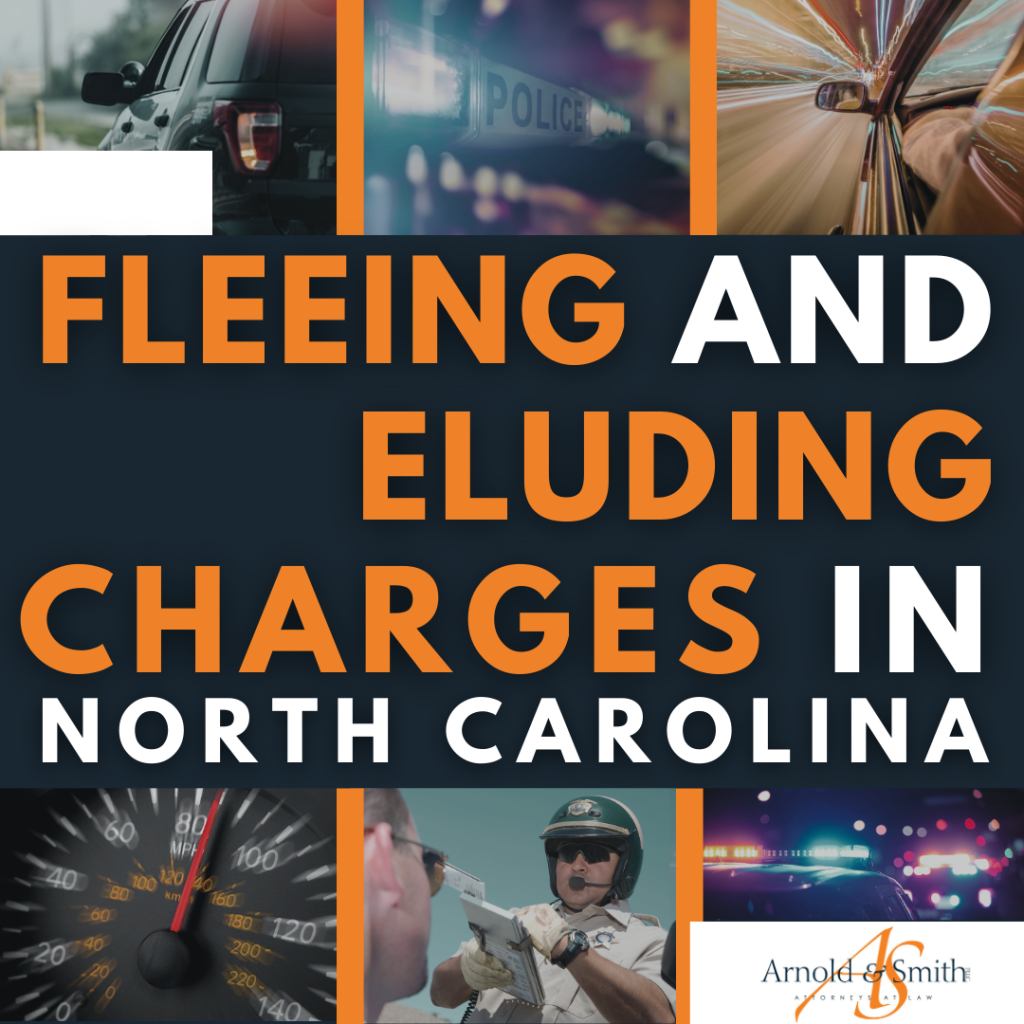 Fleeing and Eluding Charges in North Carolina
Fleeing and Eluding Charges in North Carolina
When police lights and sirens are behind you, signaling you to pull over, North Carolina law requires you to stop. You must pull to the side of the road and bring your vehicle to a full stop. Regardless of whether you agree with the traffic stop or not, you must still follow the law. If you fail to stop, the police will believe that you are fleeing and eluding. You will likely face charges of fleeing and eluding along with any other charges that might arise from the traffic stop.
What is Fleeing and Eluding?
North Carolina law states that it is “unlawful for any person to operate a motor vehicle on a street, highway, or public vehicular area while fleeing or attempting to elude a law enforcement officer who is in the lawful performance of his duties”. In general, fleeing and eluding charges may apply if a driver fails to stop for a law enforcement officer. Although you may eventually stop, you may get these charges if you do not come to a stop immediately. Fleeing and eluding may be a simple Class I misdemeanor unless aggravating factors are present.
Charlotte Criminal Lawyer Brad Smith answers the question: “The person that called the police doesn’t want to press charges, can I still be prosecuted?”
What is the “Run and You’re Done” Law?
North Carolina passed legislation in 2011 that elevates a misdemeanor fleeing and eluding charge to a felony. The law is commonly called the “Run and You’re Done” law. The law states that if you flee or elude during the commission of another crime, the charge becomes a Class H felony. These aggravating factors include speeding at more than 15 mph over the limit, driving on a suspended or revoked license, driving while impaired, driving with a minor under the age of 12 in the car, or driving recklessly. If you cause a high-speed police pursuit, you will likely be charged with a felony.

Penalties for Fleeing and Eluding
The penalties for fleeing and eluding charges depend on the severity and the presence of aggravating factors. If convicted of a felony, you could face a sentence of up to a year in jail along with other penalties. If two or more aggravating factors are present you could face up to two years in prison and if three or more aggravating factors the jail sentence increases to more than three years in prison. If a fatality occurs as a result of fleeing and eluding, the penalty could be up to seven years in prison, as well as additional penalties such as fines, probation, driver’s license suspension, and more if convicted.
Seizure and Sale of Vehicle
A felony fleeing and eluding charge also carries a penalty of seizure of the vehicle. The police can immediately take possession of your vehicle and have it towed to their holding facility. The car is held there until the case is resolved in court. The owner may be able to get the vehicle by posting a bond that is equal to double the car’s value. The owner must then provide the vehicle to the sheriff on the trial date. If acquitted, the vehicle will be returned. If found guilty, the vehicle is forfeited and sold at auction. The proceeds of the sale, minus any accumulated storage and other charges, will be provided to the lien holder.
If you have been charged with fleeing and eluding, you will want to vigorously defend the charges. There may be some options for a successful defense. An experienced criminal defense attorney will assist you in resolving the matter. Contact our legal team at Arnold & Smith, PLLC, at (704) 370-2828 for a consultation.
h a crime, including charges for resisting arrest, contact us today at Arnold & Smith, PLLC, at (704) 370-2828 for a free consultation to discuss your case.
The criminal defense attorneys at Arnold & Smith, PLLC make it their mission to zealously defend their clients on a wide range of criminal matters at both the state and federal levels. These matters may include any charge from traffic offenses; DWI/DUI; drug charges (from simple possession to possession with intent to distribute and trafficking); gun permit denials; weapons offenses; and property crimes (larceny, breaking and entering, robbery, fraud, embezzlement, white collar offenses); to sexually related offenses (indecent exposure; sexual assault, crimes against nature, removal from sex offender registry); and violent crimes (domestic violence; assault; manslaughter; homicide, murder). Other legal issues that Arnold & Smith, PLLC criminal clients may be facing include restraining orders, restraining order and probation violations, expungements; appeals; and immigration issues related to criminal charges. Our criminal defense attorneys are passionate about ensuring that individuals empower themselves by being informed about their constitutional rights, and stand at the ready to fight in the defense of those facing criminal charges.
Source:
https://www.ncleg.net/enactedlegislation/statutes/html/bysection/chapter_20/gs_20-141.5.html
Image Credit:
https://www.freeimages.com/photo/restrained-1188171
See Our Related Video from our YouTube channel:
See Our Related Blog Posts:
 Charlotte Criminal Lawyer Blog
Charlotte Criminal Lawyer Blog


